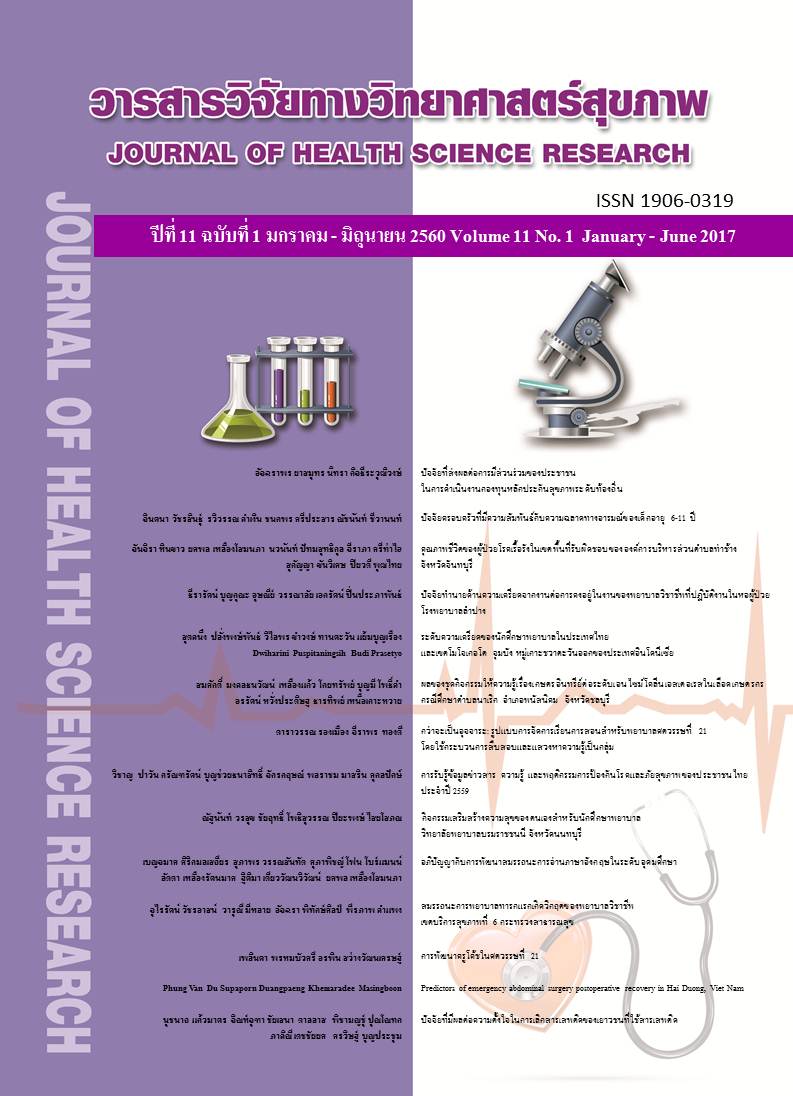ปัจจัยครอบครัวที่มีความสัมพันธ์กับความฉลาดทางอารมณ์ของเด็กอายุ 6-11 ปี
Main Article Content
บทคัดย่อ
บทคัดย่อ
ความฉลาดทางอารมณ์มีบทบาทสำคัญต่อเด็กในการสร้างสัมพันธภาพกับผู้อื่นและจัดการกับความเครียดและอารมณ์ของตนเอง วัตถุประสงค์ของการวิจัยเชิงพรรณนาหาความสัมพันธ์นี้เพื่อศึกษาความฉลาดทางอารมณ์และปัจจัยด้านครอบครัวที่มีความสัมพันธ์กับความฉลาดทางอารมณ์ของเด็กอายุ 6-11 ปี กลุ่มตัวอย่างประกอบด้วยบิดาหรือมารดาและบุตรอายุ 6-11 ปี ที่อาศัยอยู่ในชุมชนอุตสาหกรรม เกษตรกรรมประมงและท่องเที่ยว จังหวัดชลบุรี จำนวน 240 ครอบครัว เลือกกลุ่มตัวอย่างโดยวิธีการสุ่มแบบชั้นภูมิ เครื่องมือที่ใช้ในการเก็บรวบรวมข้อมูลเป็นแบบสอบถามเกี่ยวกับความฉลาดทางอารมณ์ของเด็ก ความสัมพันธ์ในครอบครัว การสื่อสารในครอบครัว และความเครียดของบิดามารดา วิเคราะห์ข้อมูลด้วยสถิติความถี่ ร้อยละ ค่าเฉลี่ย ส่วนเบี่ยงเบนมาตรฐาน และสหสัมพันธ์เพียร์สัน
ผลการวิจัยพบว่า เด็กอายุ 6-11 ปี มีความฉลาดทางอารมณ์รวมอยู่ในระดับดี ร้อยละ 19.50 ระดับที่ควรได้รับการพัฒนา ร้อยละ 70.00 และระดับที่จำเป็นต้องได้รับการพัฒนา ร้อยละ 10.50 ปัจจัยที่มีความสัมพันธ์ทางบวกกับความฉลาดทางอารมณ์ของเด็กอายุ 6-11 ปี อย่างมีนัยสำคัญทางสถิติ ได้แก่ การศึกษาของบิดามารดา ความสัมพันธ์ในครอบครัว (r = .219 และ .181 ตามลำดับ, p < .01) และการสื่อสารในครอบครัว (r = .138, p < .05) ส่วนปัจจัยที่มีความสัมพันธ์ทางลบกับความฉลาดทางอารมณ์ของเด็กอายุ 6-11 ปี อย่างมีนัยสำคัญทางสถิติ ได้แก่ ความเครียดของการเป็นบิดามารดา (r = - .195, p < .01)
บุคคลากรทางสุขภาพควรพัฒนาแนวทางในการส่งเสริมความฉลาดทางอารมณ์ของเด็กวัยนี้ให้สอดคล้องกับการศึกษาของบิดามารดา โดยการส่งเสริมความสัมพันธ์ในครอบครัว การสื่อสารในครอบครัว และควรลดความเครียดของบิดามารดา
Abstract
Emotional intelligence plays an important role in children to strengthen relationships with others and manage their own stress and emotions. The purpose of this correlational research was to examine the relationship between family factors and children’s emotional intelligence.
A stratified random sampling was used to recruit 240 parents and their children between 6-11 years old living in industrial, agricultural, fishing and tourist areas in Chonburi Province, Thailand. The instruments included demographic data forms and questionnaires about family relations, family communication, parenting stress index, and emotional intelligence. The data were analyzed using descriptive statistics and Pearson’s product moment correlation.
Results revealed that children’s emotional intelligence was 19.50 % at good level, 70.00% at should be promoted level, and 10.50% at needed to be improved. Emotional intelligence had a significant positive relationship with parent's education, family relationship (r = .219 and .181 respectively, p < .01) and family communication (r = .138, p < .05), but had significantly negative relationship with parenting stress (r = - .195, p < .01).
Nurses should promote emotional intelligence among these populations based on the context of the family, particularly in the areas of parent's education, increasing family relationship increasing family communication, and reducing parental stress.
Downloads
Article Details
บทความที่ได้รับการตีพิมพ์เป็นลิขสิทธิ์ของวิทยาลัยพยาบาลบรมราชชนนี จังหวัดนนทบุรี
ข้อความที่ปรากฏในบทความแต่ละเรื่องในวารสารวิชาการเล่มนี้เป็นความคิดเห็นส่วนตัวของผู้เขียนแต่ละท่านไม่เกี่ยวข้องกับวิทยาลัยพยาบาลบรมราชชนนี จังหวัดนนทบุรี และคณาจารย์ท่านอื่น ในวิทยาลัยฯ แต่อย่างใด ความรับผิดชอบองค์ประกอบทั้งหมดของบทความแต่ละเรื่องเป็นของผู้เขียนแต่ละท่าน หากมีความผิดพลาดใด ๆ ผู้เขียนแต่ละท่านจะรับผิดชอบบทความของตนเองแต่ผู้เดียว


